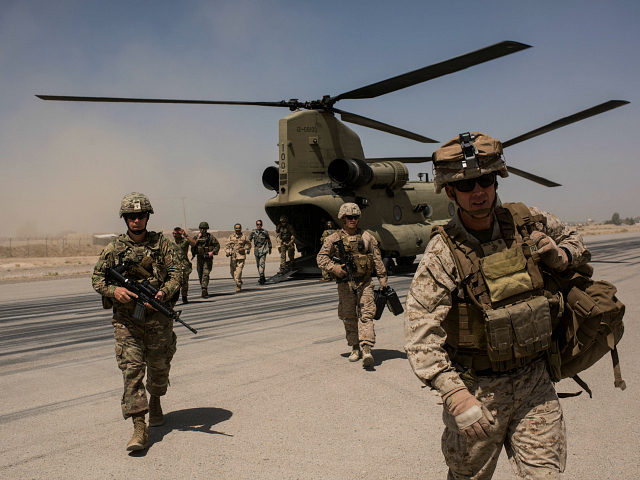Special Inspector General for Afghanistan Reconstruction (SIGAR) John Sopko testified before the House Foreign Affairs Committee on Wednesday and complained about the “odor of mendacity” surrounding everything related to Afghanistan.
Sopko said U.S. officials have “routinely lied” to the American public about numerous issues related to war and reconstruction in Afghanistan.
Sopko was asked to testify in response to a December report in the Washington Post that has become known as the “Afghan Papers.” The thrust of the Afghan Papers is that both the Bush and Obama administrations misrepresented the situation in Afghanistan by “making rosy pronouncements they knew to be false and hiding unmistakable evidence the war had become unwinnable,” and the Trump administration was not making much progress either.
The Post report said these distortions went beyond political spin into outright lies, suppressed information, and distorted data points.
Sopko responded to the publication of the report in December by agreeing that “the American people have constantly been lied to,” but the Post unsparingly noted that even SIGAR’s relatively clear-eyed “Lessons Learned” reports “left out the harshest and most frank criticisms” from those interviewed by Sopko’s investigators. The authors of the Afghan Papers noted they had to “sue SIGAR in federal court – twice – to compel it to release the documents” they requested under the Freedom of Information Act.
Sopko told the House Foreign Affairs Committee on Wednesday there has been a “disincentive to tell the truth” about Afghanistan, citing the example of Obama-era reports that touted high numbers of Afghan children enrolling in school that were based on clearly “bad” data. No one involved in preparing these reports saw any incentive to admit the number of Afghan children entering school after the fall of the Taliban was much lower than anticipated.
Sopko also talked about encouraging metrics for rising life expectancy post-Taliban that were “statistically impossible” and estimates of how much territory and population the U.S.-supported Afghan government controlled that dwindled until it was deemed unimportant, then deemed classified.
“You create from the bottom up an incentive because of short time frames – we’re there for six months, nine months, or a year – to show success. That gets reported up the chain and before we know it the president is talking about success that doesn’t exist,” he lamented.
“We have incentivized lying to Congress – and by that I mean the whole incentive is to show success, and to ignore failure, and when there’s too much failure? Classified. Or don’t report it,” he said.
“For all the lives and treasure the US and coalition partners have expended in Afghanistan, and for Afghans themselves who have suffered the most from decades of violence, the very least we can do is to learn from our successes and failures,” Sopko said, calling for more stringent oversight of reconstruction programs in the future.
Sopko’s assessment of the Afghan government and its security forces was grim.
“The Afghan military – and particularly the Afghan police – has been a hopeless nightmare and a disaster,” he said. “Part of it is because we rotate units through that aren’t trained to do the work, and they’re gone in six-to-nine months. I don’t blame the military, but you can’t bring in a Black Hawk pilot to train an Afghan policeman on how to do police work. And that’s what we were doing — we’re still doing.”
He noted that not only are many Afghan troops unpaid, they are not even being fed, obliging them to buy their own meals or steal food from their officers.
“The problem is that below that corps level, below that officer level, you have a lot of corruption, a lot of incompetence, and it’s seriously hurting the Afghan military. The biggest problem is not casualties; it’s desertion, people disappearing, or it’s people who never existed who we’re paying their salaries,” he said.
As for the justice system constructed in Afghanistan at immense American expense, Sopko talked about courthouses that stand empty because the judges are afraid to show up for work, and citizens accepting bribery as standard operating procedure.
“As much as you hate the Taliban, and I do, to the average Afghan it’s better than the justice provided by the national unity government,” he said bluntly.
Task & Purpose noted the crowning irony that many members of the House Foreign Affairs Committee skipped Sopko’s testimony because “the big news of the day was the House of Representatives voting sending articles of impeachment to the Senate.”
“Once again, the war in Afghanistan was drowned out by domestic politics and an American public with a short attention span,” T&P sighed.
Sopko told T&P in an interview after his testimony that he didn’t think most of the people delivering false information over the past 18 years were “evil” or “lying.”
“They actually believe they accomplished something. But if you don’t have good metrics and you never check them out, what do you expect?” he said.

COMMENTS
Please let us know if you're having issues with commenting.